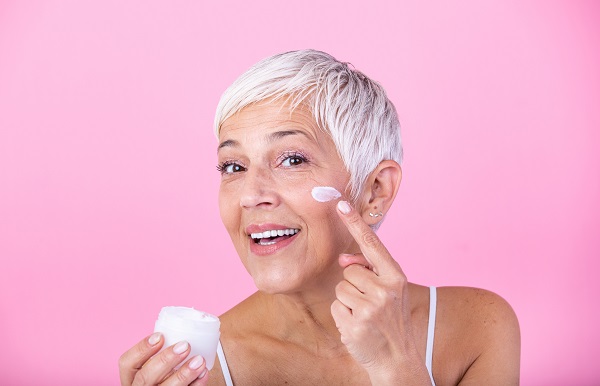Do “Anti-Aging” Skin Products Really Work?

A celebrity hosts an infomercial, touting the miraculous “fountain of youth” properties of an expensive face cream. An ad pops up on Facebook claiming that “plastic surgeons don’t want you to know about this serum that would put them out of business!” Dramatic before-and-after photos in the back of a gossip magazine show an older woman with typical wrinkles—followed by a photo-edited “after” image where the model’s face looks like a 20-year-old’s.
The U.S. Food and Drug Administration (FDA) warns that cosmetics companies may cross the line when making “anti-aging” claims in advertising and marketing. They say that many manufacturers make statements that their products can regenerate cells, boost the activity of genes, or increase collagen and elastin in the skin. Said Dr. Linda M. Katz, director of the FDA’s Office of Cosmetics and Colors, “Consumers need to know that these drug claims have not been proven to the FDA when they are making a decision to purchase one of these products.”
Dr. Katz reported that the FDA has seen a huge growth in the number of cosmetic products sold with unsubstantiated claims. She says that if makers of a skin care product claim their lotion or supplement can “turn back the biological clock,” consumers should remember the old saying: “If a product seems too good to be true, it probably is.”
That doesn’t mean that there’s nothing we can do to keep our skin as healthy as possible as we grow older. Though to an extent the appearance of our skin over the years comes from the genes we’re born with, many important lifestyle choices can also keep our skin healthy looking:
- Use sunscreen. According to dermatologists, this is the top step we can take to protect our skin from premature aging. Sun exposure leads to wrinkles, age spots, leathery skin, spider veins and skin cancer. Choose a sunscreen with an SPF (sun protection factor) of 30 or higher.
- Use a moisturizer. Especially during dry winter months, avoid chapping and cracking by applying a moisturizer to face, hands, and wherever else skin feels dry. Moisturizers need not be expensive. If yours has a high price tag, you may be paying for packaging and hype.
- Cleanse gently. Washing our face and hands regularly is so important for infection control, but some cleansers can strip the natural oils from our skin, leading to cracks and wrinkles. Look for a skin-friendly, gentle cleanser.
- Eat well and stay hydrated. A well-balanced diet that provides the nutrients we need helps keep our skin healthy. And drinking water helps us avoid dehydration of the skin. (Remember that alcoholic beverages have the opposite effect.)
- Avoid stress. A number of skin disorders have been linked to the effects of stress. Reduce stress triggers in your life as much as you can, and talk to your healthcare provider about stress management practices. Don’t forget that exercise is a top stress reducer, and is beneficial to the skin in many other ways.
- Get enough sleep. Sleep is the time when the body repairs and renews its various systems—including our skin. You’ve probably noticed that after a poor night’s sleep, your skin may look dull. This effect can be permanent if you continue to skimp on the shuteye.
- Stop smoking. Smoking causes premature wrinkling and sagging of the skin by narrowing the blood vessels so skin can’t get the oxygen and nutrients it needs to remain supple. Tobacco smoke also contains carbon monoxide and many harmful chemicals that destroy collagen and elastin
The key is to think about skin care in terms of health, not age. “Products that claim to make you look 20 years younger instantly, for example, are a waste of money—and they’re promoted on the assumption that there’s something wrong with the way you look now,” said Colin Milner, founder of the International Council of Active Aging. “The companies that market them treat older adults as though they’re damaged goods, reinforcing the erroneous belief that aging equals illness and decline.”
If you have questions about your skin, talk to a dermatologist. These specialists can recommend products and procedures that improve the appearance and comfort of our skin as we grow older. Taking care of our whole body is the key to healthy-looking skin: It seems that beauty really isn’t skin deep.
Source: IlluminAge

